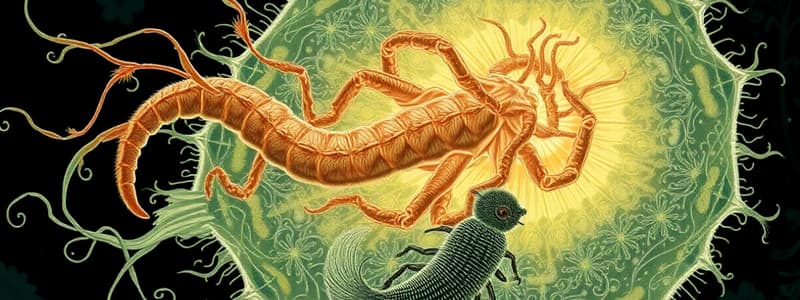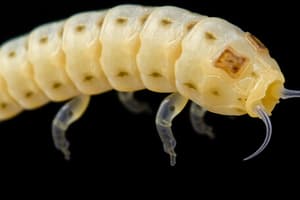Podcast
Questions and Answers
What is the infective stage of Taenia saginata?
What is the infective stage of Taenia saginata?
- Adult parasites
- Eggs
- Cyst forms
- Larvae (correct)
Which type of tapeworm corresponds to the consumption of pork?
Which type of tapeworm corresponds to the consumption of pork?
- Taenia saginata
- Hymenolepis nana
- Taenia solium (correct)
- Diphyllobothrium latum
What is the diagnostic stage of Diphyllobothrium latum?
What is the diagnostic stage of Diphyllobothrium latum?
- Adult parasites
- Eggs (correct)
- Larvae
- Cysts
Which of the following statements about Taenia solium is false?
Which of the following statements about Taenia solium is false?
What larvae are involved in the transmission of Taenia saginata?
What larvae are involved in the transmission of Taenia saginata?
What is the definitive host for Taenia saginata?
What is the definitive host for Taenia saginata?
Which of the following diseases is associated with Taenia solium?
Which of the following diseases is associated with Taenia solium?
What is the primary mode of transmission for Diphyllobothrium latum?
What is the primary mode of transmission for Diphyllobothrium latum?
Which characteristics are associated with trematodes?
Which characteristics are associated with trematodes?
What condition results from the adult form of Taenia saginata residing in the intestine?
What condition results from the adult form of Taenia saginata residing in the intestine?
What is the primary function of the scolex in body parts?
What is the primary function of the scolex in body parts?
Which component of the body structure contains both male and female sexual organs?
Which component of the body structure contains both male and female sexual organs?
Which of the following is NOT a function of the scolex?
Which of the following is NOT a function of the scolex?
Where is the neck located in relation to the scolex?
Where is the neck located in relation to the scolex?
Which of the following structures is involved in the reproductive system?
Which of the following structures is involved in the reproductive system?
Which of the following examples is classified as a nematode?
Which of the following examples is classified as a nematode?
What type of infectious stage do Ancylostoma duodenale primarily reproduce?
What type of infectious stage do Ancylostoma duodenale primarily reproduce?
Which of the following is NOT a cestode?
Which of the following is NOT a cestode?
Which organism is known for having both larvae and egg stages?
Which organism is known for having both larvae and egg stages?
What stage does Trichinella spiralis primarily utilize for infection?
What stage does Trichinella spiralis primarily utilize for infection?
What type of disease is associated with Schistosoma mansoni?
What type of disease is associated with Schistosoma mansoni?
Which schistosomiasis is caused by Schistosoma haematobium?
Which schistosomiasis is caused by Schistosoma haematobium?
What is the infective stage of Schistosoma species?
What is the infective stage of Schistosoma species?
Which of the following options is NOT a type of schistosomiasis?
Which of the following options is NOT a type of schistosomiasis?
Which organism is responsible for urinary bilharziasis?
Which organism is responsible for urinary bilharziasis?
What is a characteristic of cestodes?
What is a characteristic of cestodes?
Which method of infection is NOT associated with helminths?
Which method of infection is NOT associated with helminths?
What is true about the definitive host in the life cycle of helminths?
What is true about the definitive host in the life cycle of helminths?
Which of the following best describes nematodes?
Which of the following best describes nematodes?
What is the maximum length a cestode can reach?
What is the maximum length a cestode can reach?
Flashcards
Helminths
Helminths
A type of parasite that lives in the intestines of animals, including humans. They can range in size from a few millimeters to 15 meters long.
Cestodes
Cestodes
A group of helminths that are flat, segmented, and hermaphroditic. They can be found in various animals, including humans.
Cestodes
Cestodes
They have a flat body with a segmented structure and are often referred to as "tapeworms."
Definitive host
Definitive host
Signup and view all the flashcards
How can parasitic larvae infect humans?
How can parasitic larvae infect humans?
Signup and view all the flashcards
Scolex
Scolex
Signup and view all the flashcards
Neck
Neck
Signup and view all the flashcards
Segments
Segments
Signup and view all the flashcards
Suckers
Suckers
Signup and view all the flashcards
Hooks
Hooks
Signup and view all the flashcards
Taenia saginata
Taenia saginata
Signup and view all the flashcards
Taenia solium
Taenia solium
Signup and view all the flashcards
Diphyllobothrium latum
Diphyllobothrium latum
Signup and view all the flashcards
Infective stage
Infective stage
Signup and view all the flashcards
Diagnostic stage
Diagnostic stage
Signup and view all the flashcards
Schistosomes
Schistosomes
Signup and view all the flashcards
Intestinal Bilharziasis
Intestinal Bilharziasis
Signup and view all the flashcards
Urinary Bilharziasis
Urinary Bilharziasis
Signup and view all the flashcards
Larvae
Larvae
Signup and view all the flashcards
Flatworm
Flatworm
Signup and view all the flashcards
Roundworm
Roundworm
Signup and view all the flashcards
Study Notes
Introduction to Parasitology (Protozoa & Helminths)
- Parasites include Protozoa, Helminths, and Arthropods
- Definitive host: Host where sexual reproduction occurs
- Intermediate host: Host where asexual reproduction occurs
- Infective stage: Stage that enters the human body to cause infection
- Diagnostic stage: Stage found in samples
Protozoa
- Unicellular, eukaryotic organisms
- Measured in microns (2-150 µm)
- Mostly reproduce asexually (binary fission) or sexually
- Two main stages:
- Cyst: Dormant, non-motile, survives in the environment
- Trophozoite: Motile, actively feeding, and reproducing
Classification of Protozoa
- Amoeba: Motile by pseudopodia (e.g., Entamoeba histolytica, causing amoebic dysentery)
- Transmission: Fecal-oral
- Flagellates: Motile by flagella (e.g., Giardia lamblia, causing gastroenteritis)
- Transmission: Fecal-oral
- Ciliophora: Motile by cilia (e.g., Balantidium coli, causing balantidial dysentery)
- Transmission: Fecal-oral
- Sporozoa: Obligate intracellular parasites (e.g., Plasmodium, causing malaria; Toxoplasma with cats as definitive hosts)
- Transmission: Anopheles mosquito bite for Malaria; Definitive hosts for Toxoplasma
Helminths
- Multicellular organisms
- Stages of life include adult worms, larvae, and eggs
- Routes of transmission:
- Ingestion of eggs (fecal-oral)
- Ingestion of larvae in undercooked meat
- Skin penetration by larvae
- Definitive host: Harbors the adult worm
- Classification:
- Cestodes (tapeworms): Flat, segmented, hermaphrodites (e.g., Taenia saginata (beef tapeworm), Taenia solium (pork tapeworm), Diphyllobothrium latum (fish tapeworm))
- Taenia saginata and Taenia solium Transmission: Consumption of larvae in undercooked beef and pork, respectively.
- Diphyllobothrium latum: Transmission through consumption of larvae in undercooked freshwater fish
- Trematodes (flukes): Flat, leaf-shaped, non-segmented, unisexual. (e.g., Schistosoma mansoni, Schistosoma haematobium)
- Transmission: Larval stage with snails as intermediate hosts
- Nematodes (roundworms): Cylindrical, unisexual (e.g., Ascaris lumbricoides, Enterobius vermicularis, Ancylostoma duodenale (hookworms), Trichinella spiralis)
- Ascaris lumbricoides: Transmission through eggs, infection site: small intestine
- Enterobius vermicularis: Transmission through eggs, infection site: large intestine
- Ancylostoma duodenale: Transmission through larvae (skin penetration), complication: blood loss→ anemia
- Trichinella spiralis: Transmission through eating encysted larvae in undercooked pork
Studying That Suits You
Use AI to generate personalized quizzes and flashcards to suit your learning preferences.




